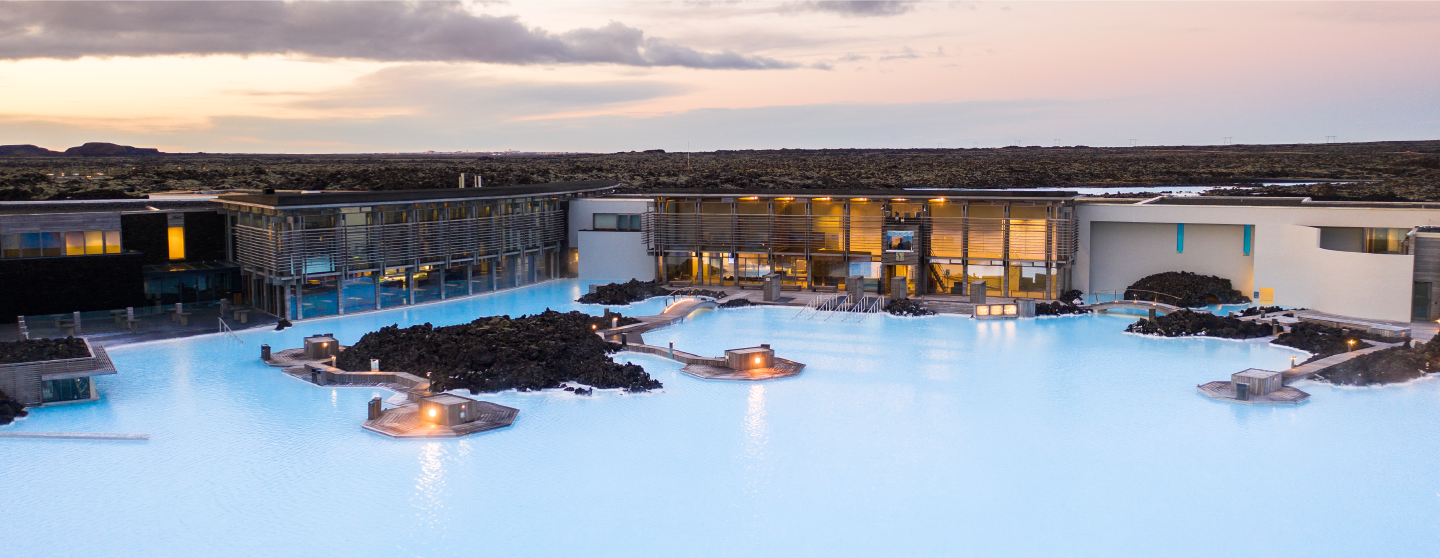

Blue Lagoon Iceland

Southern Peninsula Region, Iceland
July 2023
Accommodation
Service with Significant Environmental Footprint
Iceland
Inspired by nature, animated by science, created by design, and powered by sustainable energy, Blue Lagoon Iceland brings forth a universe of vibrant wellbeing. Its iconic centerpiece—the Blue Lagoon—was named a wonder of the world by National Geographic in 2012. Founded in 1992 to unlock the benefits of geothermal seawater, Blue Lagoon Iceland has evolved into a company encompassing unique spa experiences, research and development, sustainability, Michelin-acclaimed cuisine, and the convergence of hospitality and wellness. Every operational aspect is aligned with the company’s guiding light, “Wellbeing for people and planet”. Based on the healing properties of the geothermal seawater and its primary bioactive elements, Blue Lagoon has successfully developed internationally acclaimed skincare products. This achievement is the result of decades of research founded on scientific principles and a commitment to sustainability. Located in the Reykjanes UNESCO Global Geopark, Blue Lagoon Iceland is a paragon of sustainability. Every dimension of its operations is powered by renewable energy. From electricity, heating, and hot water to biophilic design and skincare ingredient sourcing, the company embodies a planet-friendly ethos and strives to mitigate its carbon footprint.
Overall B Impact Score
Governance 7.6
Governance evaluates a company's overall mission, engagement around its social/environmental impact, ethics, and transparency. This section also evaluates the ability of a company to protect their mission and formally consider stakeholders in decision making through their corporate structure (e.g. benefit corporation) or corporate governing documents.
What is this? A company with an Impact Business Model is intentionally designed to create a specific positive outcome for one of its stakeholders - such as workers, community, environment, or customers.
Workers 24.1
Workers evaluates a company’s contributions to its employees’ financial security, health & safety, wellness, career development, and engagement & satisfaction. In addition, this section recognizes business models designed to benefit workers, such as companies that are at least 40% owned by non-executive employees and those that have workforce development programs to support individuals with barriers to employment.
Community 24.1
Community evaluates a company’s engagement with and impact on the communities in which it operates, hires from, and sources from. Topics include diversity, equity & inclusion, economic impact, civic engagement, charitable giving, and supply chain management. In addition, this section recognizes business models that are designed to address specific community-oriented problems, such as poverty alleviation through fair trade sourcing or distribution via microenterprises, producer cooperative models, locally focused economic development, and formal charitable giving commitments.
What is this? A company with an Impact Business Model is intentionally designed to create a specific positive outcome for one of its stakeholders - such as workers, community, environment, or customers.
Environment 38.7
Environment evaluates a company’s overall environmental management practices as well as its impact on the air, climate, water, land, and biodiversity. This includes the direct impact of a company’s operations and, when applicable its supply chain and distribution channels. This section also recognizes companies with environmentally innovative production processes and those that sell products or services that have a positive environmental impact. Some examples might include products and services that create renewable energy, reduce consumption or waste, conserve land or wildlife, provide less toxic alternatives to the market, or educate people about environmental problems.
What is this? A company with an Impact Business Model is intentionally designed to create a specific positive outcome for one of its stakeholders - such as workers, community, environment, or customers.
Customers 4.0
Customers evaluates a company’s stewardship of its customers through the quality of its products and services, ethical marketing, data privacy and security, and feedback channels. In addition, this section recognizes products or services that are designed to address a particular social problem for or through its customers, such as health or educational products, arts & media products, serving underserved customers/clients, and services that improve the social impact of other businesses or organizations.
What is this? A company with an Impact Business Model is intentionally designed to create a specific positive outcome for one of its stakeholders - such as workers, community, environment, or customers.